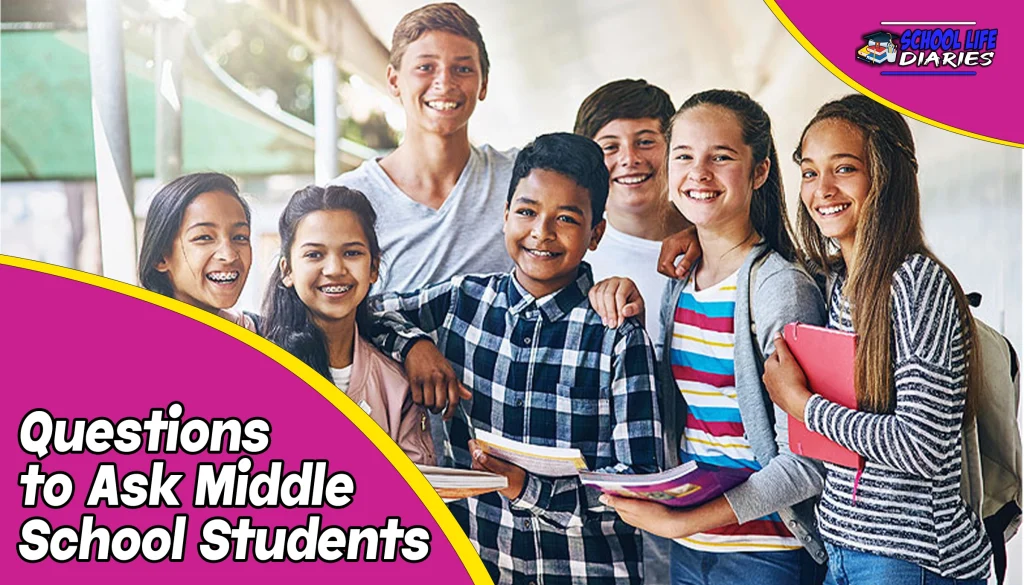Middle school is a crucial period in a student’s life when they undergo significant physical, emotional, and cognitive changes. Engaging middle school students in meaningful conversations can not only deepen their learning experience but also foster their personal growth.
Asking the right questions helps stimulate critical thinking, promotes self-expression, and builds strong relationships between students and educators.
In this article, we will explore a variety of thought-provoking questions to ask middle school students, along with tips on how to encourage open dialogue and create an inclusive learning environment.
Why Are Thought-Provoking Questions Important In Middle School?
Thought-provoking questions play a vital role in middle school education. They encourage students to think critically, analyze situations, express their opinions, and develop essential life skills.
By posing these questions, educators create opportunities for meaningful discussions and empower students to become active participants in their learning journey. Asking thought-provoking questions helps middle school students:
- Expand their knowledge and deepen their understanding of various subjects.
- Improve their critical thinking and problem-solving skills.
- Enhance their communication and articulation abilities.
- Encourage self-reflection and introspection.
- Foster empathy, respect, and understanding among peers.
Questions To Ask Middle School Students
1. Getting to Know You:
- What is your favorite subject in school? Why?
- If you could choose one superpower, what would it be and why?
- Which historical figure do you find most inspiring? Why?
- Describe a time when you felt proud of yourself. What did you accomplish?
- If you could have a conversation with anyone, living or deceased, who would it be? What would you talk about?
2. Exploring Interests and Passions:
- What hobbies or activities do you enjoy outside of school? Why?
- If you had an unlimited budget for a project, what would you create?
- What book, movie, or song has had the greatest impact on your life? Why?
- If you could travel anywhere in the world, where would you go? What would you do there?
- Who is your role model? How have they influenced you?
3. Developing Critical Thinking:
- Do you think technology has more positive or negative effects on society? Why?
- How would the world be different if everyone thought the same way?
- What are some potential solutions to address climate change?
- Can money buy happiness? Why or why not?
- Should schools eliminate homework? Why or why not?
4. Promoting Empathy and Understanding:
- How do you think your words and actions can impact others?
- What does it mean to show empathy? Can you provide an example?
- How can we create a more inclusive and accepting school environment?
- What are some ways we can support individuals who are going through a difficult time?
- Why is it important to listen to different perspectives?
5. Encouraging Goal Setting and Reflection:
- What goals would you like to achieve by the end of this school year? How can we support you?
- Reflecting on the past month, what is one accomplishment you’re proud of? Why?
- What steps can you take to improve a particular skill or area of weakness?
- How do you define success? Is it the same for everyone?
- How do you handle setbacks or failures? Can you share an example?
6. Inspiring Creativity and Imagination:
- If you could invent a new holiday, what would it be? How would people celebrate?
- Describe your dream project or assignment. What would it involve?
- How does creativity play a role in problem-solving?
- What is your favorite way to express your creativity? Why?
- How do you overcome creative blocks or moments of feeling stuck?
7. Navigating Challenges and Overcoming Obstacles:
- Can you share a time when you faced a difficult challenge? How did you overcome it?
- What strategies do you use to manage stress or pressure?
- How do you approach a problem when you don’t know the solution?
- How can perseverance and resilience help us in our daily lives?
- What advice would you give to someone facing a similar challenge?
8. Building Social Skills and Relationships:
- How do you make new friends? What qualities do you look for in a friend?
- What are some ways we can resolve conflicts peacefully?
- How do you show respect for others’ opinions, even if you disagree?
- Can you share a time when you collaborated successfully with a group of peers?
- How can we support each other in building positive relationships within our school community?
9. Exploring Future Paths:
- What careers or professions interest you? Why?
- Are there any social issues or causes that you’re passionate about? Why?
- How do you envision your life five or ten years from now?
- What skills or knowledge do you think will be essential for success in the future?
- How can we help you explore different career options and discover your passions?
10. Reflecting on Personal Growth:
- How have you grown as a person since the beginning of the school year?
- What challenges have you overcome that have helped you become more resilient?
- How do you handle constructive feedback? Can you share an example?
- What are some ways you practice self-care and maintain a healthy balance in your life?
- What are your goals for personal growth in the upcoming year? How will you achieve them?
FAQs:
1. Why should we ask questions to middle school students?
Asking questions to middle school students serves several important purposes. It encourages critical thinking, fosters self-expression, promotes active participation, and helps educators gauge students’ understanding of concepts. It creates a supportive and inclusive learning environment that values students’ perspectives and experiences.
2. How can thought-provoking questions benefit middle school students?
Thought-provoking questions engage middle school students on a deeper level, encouraging them to think critically, analyze information, and develop their own opinions. This process enhances their problem-solving skills, expands their knowledge base, and strengthens their ability to express themselves confidently.
3. How do I create a safe and inclusive environment for open discussions?
To create a safe and inclusive environment for open discussions, consider the following:
- Establish clear guidelines for respectful communication.
- Encourage active listening and empathy.
- Emphasize that diverse perspectives are valuable and should be respected.
- Provide opportunities for students to share their thoughts without fear of judgment.
- Address any instances of bullying, discrimination, or exclusion promptly and assertively.
4. What should I do if a student is reluctant to participate in discussions?
If a student is reluctant to participate in discussions, try the following strategies:
- Provide additional time for reflection before sharing thoughts.
- Offer different modes of expression, such as writing or drawing.
- Pair reluctant students with supportive peers who can encourage their participation.
- Create a safe space for one-on-one conversations to build trust.
- Celebrate small contributions and progress to boost confidence.
5. Are there any questions we should avoid asking middle school students?
While it’s essential to ask thought-provoking questions, it’s equally important to consider students’ sensitivity and respect their boundaries. Avoid asking personal questions that may invade their privacy or cause discomfort. Additionally, steer clear of questions that reinforce stereotypes or promote exclusion.
6. How can asking questions contribute to personal growth in middle school students?
Asking questions encourages middle school students to reflect on their experiences, values, and goals. It prompts self-awareness, helps identify strengths and areas for growth, and nurtures a sense of personal responsibility. By engaging in meaningful conversations, students develop essential life skills, such as critical thinking, empathy, and effective communication.
Conclusion:
Asking thought-provoking questions is a powerful tool for engaging middle school students, nurturing their personal growth, and creating a dynamic learning environment. By incorporating a diverse range of questions, educators can spark meaningful conversations, promote critical thinking, and inspire students to explore their interests, passions, and aspirations.
Through open dialogue and active participation, we can empower middle school students to become lifelong learners, critical thinkers, and compassionate individuals.





